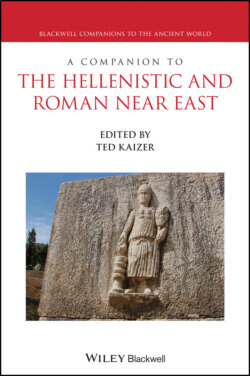Читать книгу A Companion to the Hellenistic and Roman Near East - Группа авторов - Страница 66
CHAPTER 7 Josephus
ОглавлениеJan Willem van Henten
Flavius Josephus, born as Joseph ben Matityahu in 37 CE, was a Jewish priest who acted as commander of Galilee during the Jewish rebellion against Rome (66–73/74 CE) until his arrest at Iotapata (Iotape, Hebrew Yodfat) in 67. After his prediction that the Roman commander Vespasian would become emperor materialized, he was rewarded by the new emperor and spent the rest of his life in Rome as a historian (Rajak 2002; Chapman & Rodgers 2016). He wrote four works: a history of the armed conflict between the Jews and Rome (The Jewish War (BJ)), a history of the Jewish people starting from the creation of the world up to Josephus’s own time (The Jewish Antiquities (AJ)), an autobiographical work that demonstrates his credentials (The Life (Vita)) and, finally, an apologetic work called Against Apion (Bilde 1988: 61–122). Without Josephus we would know hardly anything about Jewish history from the mid-Hasmonean period until the destruction of Jerusalem (c. 125 BCE–70 CE) – the period that saw both the rise and fall of Jewish statehood and the emergence of Christianity. There is no unambiguous evidence of a Jewish reception of Josephus’s writings in antiquity. Passages in Greco-Roman writings imply that several pagan authors were familiar with Josephus’s writings (see esp. Suetonius, Vesp. 5.6; Cassius Dio 66.4; Tacitus, Hist. 5.13; and the Epitome of Aelius Herodian’s work), but Josephus was especially popular among the Christians, who have preserved and transmitted his works.
Scholars have long considered Josephus a mere copyist, who passed on materials transmitted to him without changing much. Recent studies including literary analysis have revealed that Josephus was a historian with a complex agenda of his own. He was a Jewish author who had contemporary interests, both personal and collective. The local elite in Flavian Rome interested in Jewish culture must have been prominent among his targeted readers, including the wealthy freedman Epaphroditus, who was his literary patron (AJ 1.8; Vita 430; Apion 1.1; 2.1, 296; Mason 1998, 2003b, 2005, 2011; den Hollander 2014). Some of his Roman readers may have been Jews, especially those connected with the Herodian family (Goodman 1994; den Hollander 2014: 263–279). Because Josephus was a participant (BJ 1.3), he claims special knowledge of the war between the Jews and the Romans in 66–70 CE, which ultimately led to the destruction of the Jerusalem temple. He also claims to know that the course of events had God’s approval and that the Jews, therefore, had to accept Roman rule. The dramatic story of the defense and capture of the city of Iotapata (reported in book 3 of The Jewish War), during which Josephus surrendered to the Romans, proves this point. Josephus as a character in this story attests that the Romans had to win the war because God supported them. His surrender proved that he was a servant of God and not a traitor (BJ 3.354).
This contribution focuses on some aspects of Josephus’s significance as a source for the history of the Near East in the Hellenistic and Roman periods. I will start with briefly discussing the content of Josephus’s four works. The subsequent sections deal with the relevance of these works for the history of the Jews in Judaea and other territories controlled by a Jewish ruler, Josephus’s geographic information, the picture of so-called friendly kings that arises from his work, and finally, some of the passages about Diaspora Jews and other nations that figure prominently in Josephus.
